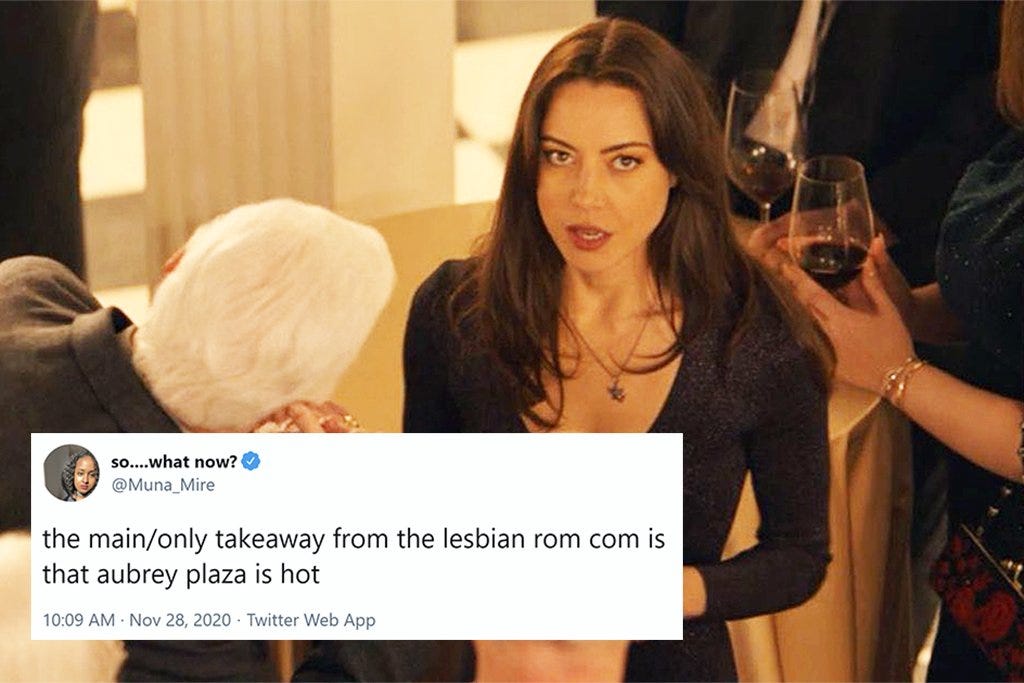As a clinical procrastinator, I chose the last socially acceptable week to watch Hulu’s tinsel infused Happiest Season. Looking forward to savoring the last bit of holiday cheer, I tuned in hoping to find a queer film that would at least dent the mold of a traditional holiday Hallmark-ian film.
Written and directed by filmmaker and actor Clea Duvall (VEEP), the Happiest Season centers on Harper (Mackenzie Davi) and her girlfriend (Kristen Stewart)’s visit to Harper’s family for Christmas. Of course, there’s a catch: Harper hasn’t come out to her conservative family, leaving Abby to act as her “roommate.”
Unfortunately, the movie is almost as basic as my love for a seasonal latte. From the inevitable choice of a coming out story to being outed by a family member, this film feels trapped by Hollywood’s rules about what type of LGBTQ story can be told.
The first rule is the whiteness upon which this holiday film is centered. Let’s face it the casting landscape in most holiday films is similar to the perfect winter wonderland — completely and inevitably white. Like Home Alone, The Holiday, and Love Actually before it, the Happiest Season covers its cozy, eggnog, cookie-cutter stories in whitenesses, begging me to ask: who are these stories made for?
People of color deserve to see their stories told no matter the genre, especially queer people. Hollywood acts like POCs don’t even celebrate the holidays and that somehow we wouldn’t be interested in holiday stories that center us. This is not to say that stories centering a white family are inherently bad, as Dan Levy’s Schitt’s Creek has shown us. The catch is to disrupt the repetitive narrative and tell a story with complex stories that use whiteness as a subversive tool, not a crutch.
Happiest Season had the opportunity to center a queer POC character: Aubrey Plaza as Harper’s ex-girlfriend Riley. And I’m not the only one who thinks so. The internet has formed around a rare consensus that Riley should have ended up with Kristen Stewart’s Abby, to which I simply say: agreed. All we know about Harper is that she’s a writer while Riley is finishing her residency at Johns Hopkins.

Plaza steals the show with her amazing holiday suit ensembles and her classic “too cool for the drama” aesthetic (perfected in her time in Parks and Rec). Riley provides Abby with a confidant to vent to at holiday parties and take her to a local bar with drag queens singing Christmas classics. Riley serves as Abby’s guide back to her queerness and herself. Riley gives Abby space to voice and explore her insecurities about her girlfriend who’s still in the closet. Her sarcasm and lack of familial baggage make her character not just far more interesting than either Harper or Abby but also breaks the traditional role most supportive Latinx characters have to play.
Rarely do Latinx characters in films get to play roles outside of typical stereotypes. Plaza’s character is simply a queer ex-girlfriend finishing her residency at Johns Hopkins. Not a sensual Latina Barbie character limited to her sex appeal. Not an immigrant struggling to make it in this country. That in and of itself makes Riley a radical role in a not so quite radical queer film.
While Plaza is one of the few POC actors in the film, she also can pass, even in this film where whiteness is so pervasive, it’s almost its own character. Generally in Happiest Season, POCs are in the stereotypical and predictable role of background, whose stories would not exist if it weren’t for the main (white) characters. Yes, Plaza is relegated to a supportive character too, and isn’t able to fully embody her Latinxness, but she’s arguably the breakout star of the film. Happiest Season ignores her to her own detriment.
It’s so disappointing that when we finally center queer characters in a holiday film (or elsewhere!) they are inevitably and too often white. Riley deserves her own movie where her girlfriend, played by Tessa Thompson, comes home to visit her family for Christmas. I want to see Edward Olmos and Rita Moreno as the parents. Where is this film? And others like it?
We need trans folks, nonbinary characters played by queer actors of color to be centered in these films. Too often holiday films and films, in general, continue the notion that queerness (and POC identity) is an obstacle that is meant to be overcome. That’s why we love shows like Pose that do not paint over prejudice, systemic racism, and transphobia but also give their characters joy and storylines that are not limited by their identity.
It’s time to make our own holiday films that bring in the full spectrum of POC queerness.

